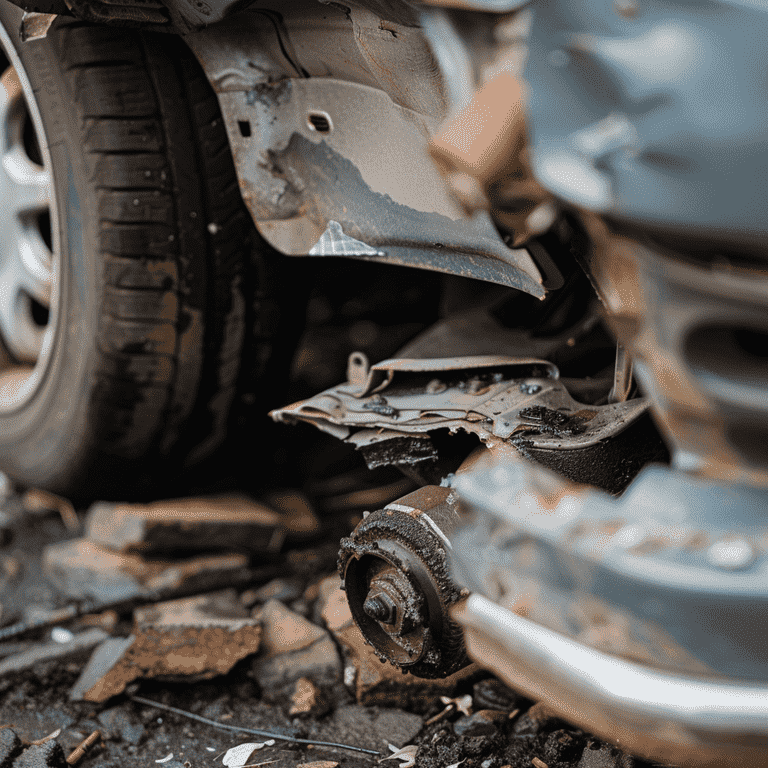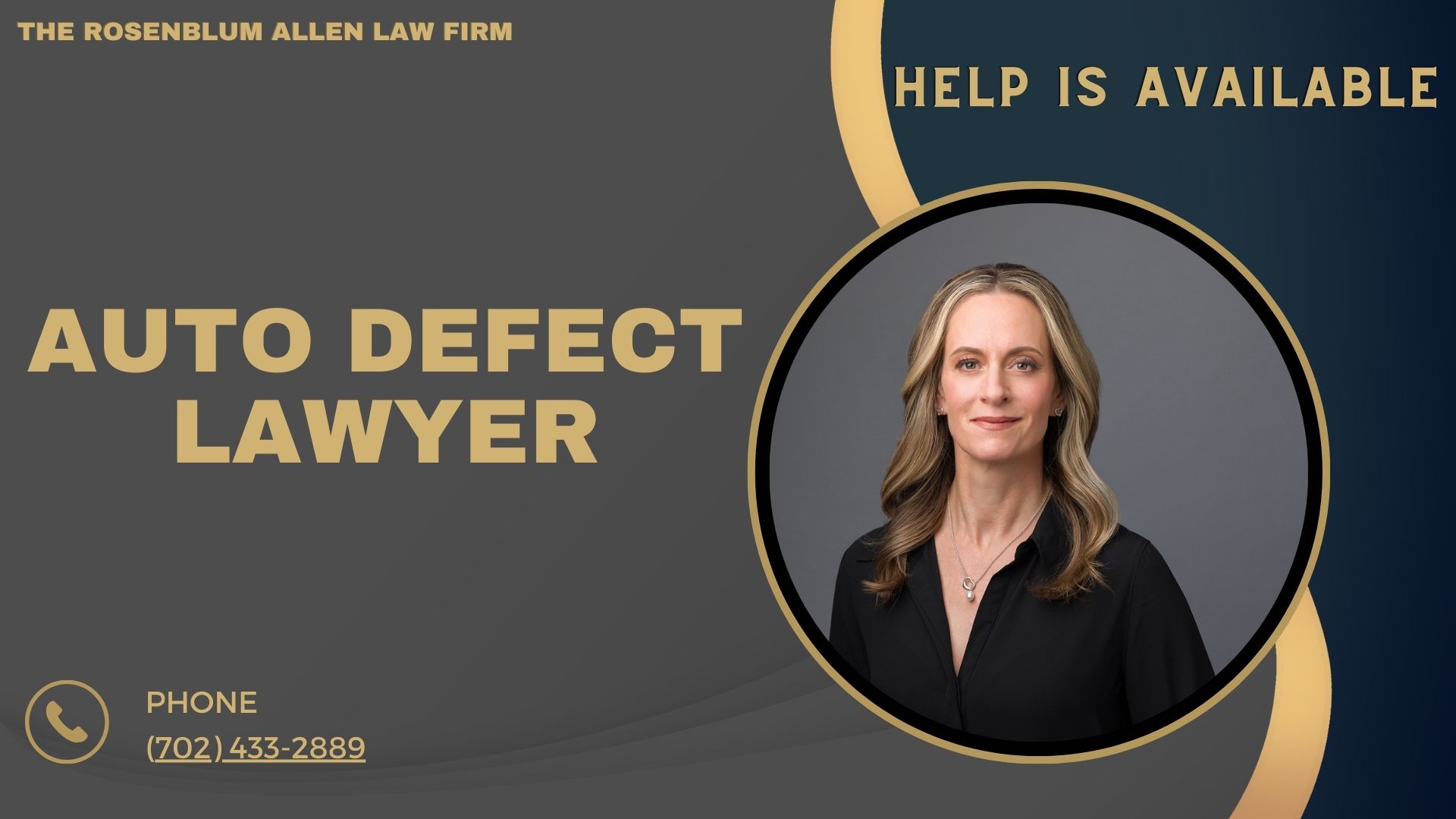Millions of people rely on their vehicles daily to get them safely from one place to another. But, when a car defect happens, it can cause severe accidents, injuries, and even deaths. This is where an experienced auto defect lawyer comes in. They can help you navigate the complex legal landscape. They will also fight for your deserved compensation.
Understanding Auto Defects
Auto defects are flaws in a vehicle that can harm the driver, passengers, or others on the road. They can arise from various stages of the vehicle’s life cycle.
Definition and Types of Auto Defects
Auto defects can be categorized into three main types:
Design Defects
Design defects occur when a vehicle’s design has an inherent flaw. These defects exist even before the vehicle is manufactured.
Explanation and Examples: A design defect might involve a vehicle with a high center of gravity that makes it prone to rollover accidents. Another example is a poorly designed fuel system that increases fire risk in a crash.
Manufacturing Defects
Manufacturing defects happen during the production process. These issues affect individual vehicles rather than an entire model line.
Explanation and Examples: A manufacturing defect could be a seatbelt that wasn’t correctly installed, leading to failure in an accident. Another example is a batch of tires produced with substandard materials, causing them to wear out prematurely.
Marketing Defects (Failure to Warn)
Marketing defects happen when the maker fails to give enough warnings or instructions about using the vehicle.
Explanation and Examples: If a vehicle has a known issue that requires regular maintenance but the manufacturer does not include this information in the owner’s manual, this is a marketing defect. Another example is the failure to warn about a dangerous feature, such as a rear blind spot in a large vehicle.
Common Auto Defects and Their Impacts
Auto defects can lead to severe consequences. Here are some common defects and their potential impacts:
Brake Failures: This can lead to an inability to stop the vehicle, causing collisions.
Airbag Malfunctions: Airbags that fail to deploy or deploy unexpectedly can result in serious injuries.
Seatbelt Failures: This can lead to passengers being ejected from the vehicle during an accident.
Tire Defects: Defective tires can blow out, leading to loss of control.
Engine and Transmission Issues: This can cause the vehicle to stall or fail to accelerate correctly, increasing the risk of accidents.

The Role of an Auto Defect Lawyer
Auto defect lawyers specialize in helping victims of defective vehicles. Their expertise is crucial in securing fair compensation.
Explanation of What an Auto Defect Lawyer Does
An auto defect lawyer provides various services to handle your case effectively.
Investigating the Defect: They gather information about the Defect, including how it occurred and its impact.
Gathering Evidence includes collecting repair records, accident reports, and testimonies.
Filing a Lawsuit: They handle all legal paperwork and file your case in court.
Negotiating Settlements: They deal with the manufacturer or insurance company for a fair settlement.
Representing in Court: If necessary, they will take your case to trial and represent you before a judge and jury.
Importance of Legal Expertise in Auto Defect Cases
Hiring a lawyer with expertise in auto defect cases is essential due to the complexities involved.
Knowledge of Auto Industry Standards: They understand the technical aspects of vehicle design and manufacturing.
Understanding of Product Liability Laws: They are well-versed in the laws that govern product defects and consumer rights.
Experience with Auto Manufacturers and Insurance Companies: They know how to deal with large corporations and their legal teams.
Working with an experienced auto defect lawyer increases your chances of a successful outcome. They have the skills and resources to fight for the compensation you deserve, ensuring your rights are protected at every step.

How to Choose the Right Auto Defect Lawyer
Choosing the right lawyer can make all the difference in your case. Here’s what you need to know to make an informed decision.
Qualifications to Look for in an Auto Defect Lawyer
When searching for an auto defect lawyer, consider these essential qualifications:
Relevant Experience
Experience is crucial in handling complex auto defect cases.
Previous Cases Handled: Look for a lawyer who has successfully handled auto defect cases like yours.
Success Rate: A high success rate can indicate their ability to win cases and secure client compensation.
Legal Credentials
Credentials ensure that the lawyer is qualified to represent you.
Education and Training: Check their educational background and specialized training in product liability law.
Bar Association Memberships: Membership in state and national bar associations can indicate their standing in the legal community.
Questions to Ask During the Initial Consultation
Prepare a list of questions to ask during your first meeting with a potential lawyer.
Case Evaluation Process: Ask how they will evaluate your case and determine its merits.
Legal Fees and Payment Structure: Understand their fee structure. Some lawyers work on a contingency basis, meaning they only get paid if you win.
Expected Timeline and Outcomes: Know how long the case might take and what outcomes you can realistically expect.
Red Flags to Watch Out For
Be cautious of these warning signs when choosing a lawyer:
Lack of Transparency: Consider it a red flag if they need to be more transparent about their fees or the process.
Overpromising Results: Be wary of lawyers who guarantee a specific outcome, as no one can predict the results of a case with certainty.
Poor Communication: If they are difficult to reach or do not respond promptly, it could indicate future communication issues.

Steps to Take if You Suspect an Auto Defect
Taking prompt action is crucial if you suspect your vehicle has a defect. Here are the steps you should follow:
Immediate Actions to Ensure Safety
Your safety is the top priority. Follow these steps immediately:
Stop Using the Vehicle: If you believe your car is unsafe, stop using it immediately.
Document the Defect and Incident: Take detailed notes and photos of the Defect and any related incidents.
Report the defect to the manufacturer: Notify the manufacturer so they can get it on record.
Gathering Evidence to Support Your Case
Collecting evidence is critical for a strong case. Here’s what you need:
Medical Records: Keep records of any injuries related to the Defect.
Repair and Maintenance Records: These documents can show a history of issues related to the Defect.
Witness Statements: Get statements from anyone who witnessed the Defect or related incident.
Photographic Evidence: Photos of the Defect and any damage can be robust evidence.
Contacting an Auto Defect Lawyer
Once you have gathered your evidence, it’s time to contact a lawyer.
Initial Consultation: Schedule a consultation to discuss your case and get a professional evaluation.
Case Evaluation: The lawyer will review your evidence and advise on the best action.

Understanding the Legal Process
Navigating the legal process can be complex. Here’s what you can expect:
Overview of the Legal Process in Auto Defect Cases
Auto defect cases follow a series of steps. Knowing these steps can help you feel more prepared.
Filing the Complaint: Your lawyer will file a formal complaint against the manufacturer.
Discovery Phase: Both sides gather evidence. This can include depositions, document requests, and testimony.
Pre-Trial Motions: Your lawyer may file motions to resolve the case before it goes to trial.
Settlement Negotiations: Many cases are settled out of court. Your lawyer will negotiate on your behalf.
Trial Process: Your case will go to trial if a settlement isn’t reached. Your lawyer will present your case to a judge or jury.
Potential Outcomes of an Auto Defect Lawsuit
Understanding the possible outcomes can help set realistic expectations.
Settlements: Most cases end in a settlement. This means you receive compensation without going to trial.
Jury Verdicts: If your case goes to trial and you win, the jury will decide on the compensation amount.
Appeals Process: If either party is unhappy with the verdict, they can appeal it. This can prolong the legal process.

Compensation in Auto Defect Cases
If you’ve been affected by an auto defect, you deserve compensation for your losses. Here’s what you need to know about the types of compensation and factors that can affect your case.
Types of Compensation Available
There are several types of compensation you might be entitled to in an auto defect case. These can help cover various losses and expenses.
Medical Expenses: This includes all medical costs related to the injury. It covers hospital bills, surgeries, medications, and ongoing treatment.
Lost Wages: If your injury prevents you from working, you can claim compensation for lost wages. This includes future earnings if the injury affects your ability to work long-term.
Pain and Suffering: This type of compensation covers the physical and emotional distress caused by the injury. It’s more subjective but can be significant.
Property Damage: If your vehicle or other property was damaged due to the defect, you can claim the repair or replacement costs.
Factors That Affect the Amount of Compensation
Several factors can influence the amount of compensation you receive. Understanding these can help you set realistic expectations.
Severity of Injuries: More severe injuries typically result in higher compensation. This includes both immediate and long-term impacts on your health.
Impact on Quality of Life: You may receive more compensation if the defect significantly affects your daily life. This includes loss of enjoyment of life and disability.
Degree of Manufacturer Negligence: If it’s proven that the manufacturer was grossly negligent, the compensation amount can be increased. This might involve punitive damages designed to punish the manufacturer and deter future negligence.

Breaking It All Down
Auto defects can have life-altering consequences. Hiring an experienced auto defect lawyer ensures you get the justice. It ensures you get the compensation you deserve. They can help you navigate the complex legal process. They will gather the needed evidence and fight for your rights.
Remember, if you suspect an auto defect, take immediate action. Stop using the vehicle, document everything, and contact a lawyer immediately. Doing so protects your rights and increases your chances of a successful outcome.

Frequently Asked Questions
What is an auto defect?
An auto defect is a flaw in a vehicle that can cause harm to the driver, passengers, or others on the road. Defects can occur in design, manufacturing, or marketing (failure to warn).
How do I know if my car has a defect?
If your vehicle shows unusual behavior or parts fail unexpectedly, it might have a defect. Common signs include brake failures, airbag malfunctions, seatbelt failures, tire issues, and engine or transmission problems.
What should I do if I suspect my car has a defect?
Stop using the vehicle immediately. Document the defect and any related incidents, take photos, and report the defect to the manufacturer. Then, contact an auto defect lawyer to discuss your case.
Why do I need an auto defect lawyer?
An auto defect lawyer specializes in handling cases involving defective vehicles. They have the expertise to investigate the defect, gather evidence, file a lawsuit, negotiate settlements, and represent you in court if necessary.
What should I look for in an auto defect lawyer?
Look for a lawyer with relevant experience in auto defect cases, good legal credentials, and a strong success rate. Ask about their case evaluation process, fees, and expected outcomes during the initial consultation.
What kinds of compensation can I get in an auto defect case?
You can get compensation for medical expenses, lost wages, pain and suffering, and property damage. The amount depends on factors like the severity of your injuries and the impact on your quality of life.
What is the legal process for an auto defect case?
The method includes filing a complaint, going through discovery, pre-trial motions, settlement negotiations, and possibly a trial. Your lawyer will guide you through each step.
How long does an auto defect case take?
The timeline varies depending on the case’s complexity and whether it goes to trial. Your lawyer can provide an estimate based on the specifics of your case.
Can I still file a case if my car is older?
Yes, you can file a case for an older car if the defect caused harm, and you can provide evidence of the defect and resulting damages. Consult with a lawyer to assess your case.
What if the manufacturer offers a settlement?
Discuss any settlement offers with your lawyer. They can help you evaluate if the offer is fair or if you should negotiate for more compensation.

Additional Resources for You
In addition to her expertise in handling auto defect cases, our lead attorney, Molly Rosenblum Allen, Esq, has created several other valuable resources to assist you in your time of need. Here are some links to these resources:
- Las Vegas Personal Injury Attorney: Visit Here
- Las Vegas Car Accident Attorney: Visit Here
- Motorcycle Accident Lawyer Las Vegas: Visit Here
- Wrongful Death Lawyer Las Vegas: Visit Here
- Truck Accident Attorney Las Vegas: Visit Here
- Las Vegas Drunk Driving Accident Attorney: Visit Here
- Las Vegas Slip and Fall Attorney: Visit Here
These resources are designed to provide comprehensive support and information for various legal needs you might encounter. Molly Rosenblum Allen and her team are dedicated to helping you navigate through challenging times with effective legal guidance and support.

Outside Resources for You
National Highway Traffic Safety Administration (NHTSA): Provides comprehensive information on vehicle safety and recalls. Visit NHTSA
Consumer Reports: Offers detailed reviews and ratings of vehicles, including information on safety and defects. Visit Consumer Reports
Insurance Institute for Highway Safety (IIHS): Conducts research and produces safety ratings for various vehicles. Visit IIHS
Center for Auto Safety: Advocates for auto safety and provides resources on vehicle defects and recalls. Visit Center for Auto Safety
Safe Kids Worldwide: Focuses on preventing injuries in children, including those related to vehicle safety. Visit Safe Kids Worldwide
American Association for Justice (AAJ): Provides resources and support for individuals seeking justice in personal injury cases. Visit AAJ
Road Safety Foundation: Promotes safer road conditions and provides information on vehicle safety. Visit Road Safety Foundation

A Special Message from Our Lead Attorney, Molly Rosenblum Allen, Esq

Dear Reader,
Thank you for taking the time to explore our resources. I hope you found the information helpful and informative. If you have any questions or need help, please don’t hesitate to reach out.
My team and I are here to help you navigate your legal challenges. Call us at (702) 433-2889 to get the ball rolling. We’re ready to provide the support and expertise you need.
Best regards,
Molly Rosenblum Allen, Esq.
The Rosenblum Allen Law Firm







